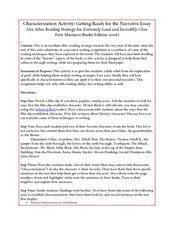Curated OER
Similes
Similes are a great way to get your writers thinking about descriptive details. They read a brief explanation which covers clichés and the general wording of a simile. Then, learners try a few on their own. First, they complete nine...
Curated OER
Synonyms
Help keep your writers from using the same words in their writing: introduce them to synonym. Learners read a brief explanation of synonyms with examples. Then, they fill in a chart by writing synonyms for six adjectives. Consider having...
Curated OER
Information from Posters
Budding journalists examine and evaluate an informative poster advertising a public meeting to discuss city park issues. They write a paragraph explaining what they found to be effective and ineffective about the poster, then imagine...
Curated OER
Persuasive Arguments
Examine persuasive writing using this informational excerpt about natural habitat conservation. Readers examine the headings of three paragraphs to determine their effect, then copy the first sentences of each. They use these topic...
Curated OER
g and q
Give printing practice a creative spin as young writers become familiar with the lowercase letters g and q. They trace each letter four times before printing a set on their own in the space provided. The fun twist is that...
DK Publishing
Tracing Numbers, Part 2
Can your kindergartners write their numbers through 10? What about number patterns? This resource is a great way to get those training pencils moving! After tracing numbers 0 - 9, little writers continue three number patterns. Use this...
Curated OER
Big, Bigger, Biggest
Which turtle is big, and which one is biggest? Add variety to your third graders' writing with a comparative adjective activity. Given eight adjectives, young writers find the comparative and superlative forms of each. The last two are...
Curated OER
Commas
Learning how to properly use the comma is an important writing skill. This activity, designed for first graders, gives them some coaching on the subject along with opportunities to practice. There are five sentences which must be written...
Curated OER
Proofreading
Do your second graders like riddles? Give them a giggle and a lesson about proofreading at the same time. After reading two riddles, young writers fix punctuation and capitalization errors. They write the answer to each riddle at the...
Dorling Kindersley
Punctuation Practice
Need some punctuation practice? Challenge your third or fourth graders' editing skills with a helpful instructional activity on punctuation. After naming different types of punctuation marks, they rewrite a paragraph that has multiple...
Curated OER
Writing to Make a Point
Begin your persuasive writing with a helpful exercise on making points. With a list of ten points on transportation in a city, third graders map a logical order to their argument. They then write one or two paragraphs about the points...
Curated OER
Genre Lesson: Autobiography
Start kids thinking about point of view and autobiographies by telling them a short story about your morning (first person), and then asking a volunteer to re-tell the story to you (second person). There are tips to help you tie this...
Curated OER
Avoiding Run-On Sentences (II)
Polish the writing skills of your emerging writers by eliminating run-on sentences in their work. Discuss the ways to correct run-ons before releasing your class to work on this 20-sentence worksheet independently. An answer sheet is...
Curated OER
Sentence Combining/Sentence Variety
Challenge your writers to improve their writing by introducing them to 10 strategies they can use to vary their sentence structures. Each strategy is described and examples given. Pupils then create their own sentences using this...
Curated OER
Sentence Construction
Switch it up! Present young writers with suggestions for how to add variety and interest to their writings. Using a draft of one of their papers, viewers bracket the first words of their sentences and use the provided questions to...
Curated OER
French Grammar Worksheet: futur simple
Help your Francophiles master the futur simple tense. There are five exercises provided here that require the writer to conjugate words in the target tense and create sentences in the future.
Curated OER
Figurative Language in Romeo and Juliet
Shakespeare was such a talented writer, but why? It must be his use of figurative language, blended with his clever, twisting plots. This worksheet focuses on his use of metaphor, simile, personification, oxymoron, and hyperbole within...
Curated OER
Developing an Outline
A lot of writers don't like creating an outline before writing the first draft of their paper. Introduce them to what an effective and organized outline looks like with this presentation. Designed for higher education, you could easily...
Curated OER
Academic Language
College-level writers learn the importance of using academic language in their papers and essays. Assessing the audience is an important aspect of choosing the language with which one writes. Review these 10 slides to make sure each...
Curated OER
Revising Your Draft
Revising, as opposed to editing, is the focus of a presentation that details this essential part of the writing process. The author of this PowerPoint suggests outlining the draft to determine if all the necessary elements are included...
Curated OER
Food Translation
Practice translating a series of sentences using food and shopping vocabulary. There are 10 short sentences to translate, and a short essay question is also included. For the short essay question, writers describe what they eat and drink...
Curated OER
Extremely Loud and Incredibly Close: Characterization Activity
Oskar Schell's narrative about his expedition to find out more about his father serves as a model for writers who are crafting their own narratives. Class members choose two characters from the novel and collect examples of the methods...
Alabama Learning Exchange
Don't Get Lost in Story Writing: Story Maps
Ease young writers into the process of writing a story with a colorful presentation on story maps. Viewers use the provided sentence frames to craft a sample story as guided practice. They then draft their own stories to share with the...
Alabama Learning Exchange
"The Inside Search" from Dust Tracks on a Road by Zora Hurston
Who is Zora Neale Hurston? Read the autobiography the best known female writer from the Harlem Renaissance. After reading the novel Dust Tracks on a Road, have your class complete this packet. There are 12 multiple-choice questions...
Other popular searches
- Freedom Writers
- Writers Workshop
- Writers Notebook
- Writers Craft
- Freedom Writers Movie
- Writers Craft Story Starters
- Natural History Writers
- Writer's Workshop
- Writers Block
- Freedom Writers Diary
- Women Writers
- Beat Writers

























